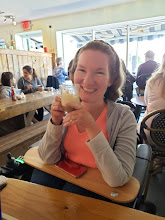Once
upon a time, there was a Great King, who reigned over the Great Kingdom, lived
in a great castle, high on a great hill on the fringe of a great forest. Up the
hill was a path, always smooth and steady, so that anyone could travel it to
see the King at any time. The path was bordered on both sides by fragrant gardenias
and dancing daffodils and splendid azaleas, and blossoming fruit trees that
yielded sweet cherries, peaches and plums. Streams of laughing water flowed
from the hill as well and brought refreshment and life to the village below.
And though the scene was beautiful and the path was accessible and the King was
very good, there was a time in the history of the Great Kingdom when the
citizens rarely took the journey, and hardly noticed the great castle at all.
Business
was prosperous in the village – the streams produced rich soil, which produced
healthy crops, which produced bountiful harvests. The people were hard workers,
very intelligent and very skilled, so they created products of the most
excellent quality to sell and trade. They lived for the business, and were consumed
with doing: growing more crops,
making better products, gaining more money, and buying more things, to improve
on and start the process all over again. After the annual Market Festival,
servants were hired to carry a tithe of the wealth to the King’s castle along
with letters from the villagers that read something like this:
O Great King, live forever!
This year the business was very good. I harvested more cotton this
season than ever before from my fields. I used a machine I invented to spin the
cotton into thread, and then I used a machine I bought at a great price to
weave it into the delicate fabric you see here before you. I also dyed it into
these gorgeous hues that I collected and mixed myself. I hope that when you see
the high quality of my handwork, and know of the great sacrifices I’ve made, that
you will see my worth and grant my family a place among your royal nobility.
Your most prosperous citizen,
Constantine
Boastifous
These gifts and
notes were sent year after year, but the citizens were always disappointed by
the silence and restraint of the Great King.
One day a young
man came into the village alone. He had rust-colored ringlets of hair that fell
across his forehead and around his ears in a charming way, and freckles across
the bridge of his nose. He wore curious foreign clothing, including a long
moss-green hooded cloak that only a few of the villagers could recognize as
coming from the Elvish colony on the other side of the river. He was certainly
not an elf – that was clear from his freckled complexion, rounded ears, and his
knobby, angular joints. But there was also the way he moved: he did not glide
gracefully and with power, but hobbled along with an Elvish carved crutch of
oak tucked under his arm.
“Who is he?…
What is he doing here?… What is wrong with him?… What does he want?…” These questions
were loudly thought and quietly whispered throughout the village, but no one
dared to ask the stranger. Besides, he didn’t appear to be looking for a place
to settle down. Without a word and with his eyes fixed straight ahead, he
rhythmically moved the crutch and his legs down the main street of the village
and out toward that smooth path, that tall hill, that great castle.





No comments:
Post a Comment